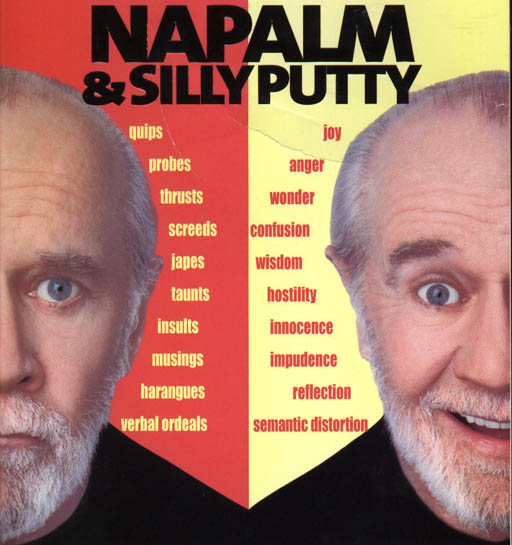 The seven words you can’t say on TV. There. The thing that every blobit (blog + obit = blobit) is going to focus on is out of the way and we can get to what George Carlin really was on about. It wasn’t curse words. It wasn’t drugs. It was freedom.
The seven words you can’t say on TV. There. The thing that every blobit (blog + obit = blobit) is going to focus on is out of the way and we can get to what George Carlin really was on about. It wasn’t curse words. It wasn’t drugs. It was freedom.
From his early exposure as the hippy-dippy mailman on Rowan and Martin’s Laugh-In to his most recent and venomous HBO comedy specials, from his ill-fated sitcom and recurring role on Thomas the Tank Engine to Bill & Ted and a handful of sardonic, sarcastic, and sometimes sacrilegious best-selling books, Carlin was a guy who wanted to say whatever he damn well felt like saying, regardless of whose fragile sensibilities would be crushed in the blowback. The essence of the man was his love of the language, both the sacred and the profane. His classic skit about hair, for instance:
I’m aware some stare at my hair.
In fact, to be fair,
Some really despair of my hair.
But I don’t care,
Cause they’re not aware,
Nor are they debonair.
In fact, they’re just square.
They see hair down to there,
Say, “Beware” and go off on a tear!
I say, “No fair!”
A head that’s bare is really nowhere.
So be like a bear, be fair with your hair!
Show it you care.
Wear it to there.
Or to there.
Or to there, if you dare!
My wife bought some hair at a fair, to use as a spare.
Did I care?
Au contraire!
Spare hair is fair!
In fact, hair can be rare.
Fred Astaire got no hair,
Nor does a chair,
Nor a chocolate éclair,
And where is the hair on a pear?
Nowhere, mon frere!
So now that I’ve shared this affair of the hair,
I’m going to repair to my lair and use Nair, do you care?
The two sides could not have been drawn more distinctly — the wordsmith, the guy who wielded silliness like a deft rapier and danced around you in tights and then the guy who had no compunction or hesitance with jamming the thing right in your eye. Both somehow made this whole George Carlin we came to admire, yet the events of recent years served to quiet down his former and boil his latter to a fever. His rants about how earth would once again be the wonderful, intended and truly free place once all the people were dead, how mania often leads to mania and, if bullets flew then so be it, caused a small backlash immediately following the national crisis of 9/11. While America seemingly was scrambling for shelter while binging on comfort food, Carlin was on the roof flipping off every last creature in sight because, purportedly in America you had the inalienable right to express yourself.
And that is what I’ll remember most about George Carlin. When it seemed like the worst time to have such a reaction, he did it loudly and with no small amount of pride. When the populace was ready to give up as many liberties as they could account for, he said “no” in more than a million ways and with more than “seven dirty words.” As the politicians made speeches that implored everyone to “go on as normal or else terrorist fear is terrorist victory” and then proceeded to scare the crap out of everyone to keep them in line and voting for “the winning team,” Carlin’s joy, rage, poetry, anarchist diatribe, dogma and sacrificial sacred cows made it alright to laugh at absurdity, laugh at fear, laugh at a nature that, while fundamentally human might not be fundamentally correct.
 In short, you may think Carlin was about comedy, or maybe about shock. Maybe he was about anger or perhaps he was about that place you get to once you’ve screamed it all out of your system. George Carlin was really about freedom and about grabbing it in an unqualified, two-fisted way and not letting anyone, including one’s fearful side, take it away. His imitators are many, but unless they come to that essential core of the man, they’ll never replace him.
In short, you may think Carlin was about comedy, or maybe about shock. Maybe he was about anger or perhaps he was about that place you get to once you’ve screamed it all out of your system. George Carlin was really about freedom and about grabbing it in an unqualified, two-fisted way and not letting anyone, including one’s fearful side, take it away. His imitators are many, but unless they come to that essential core of the man, they’ll never replace him.




Comments